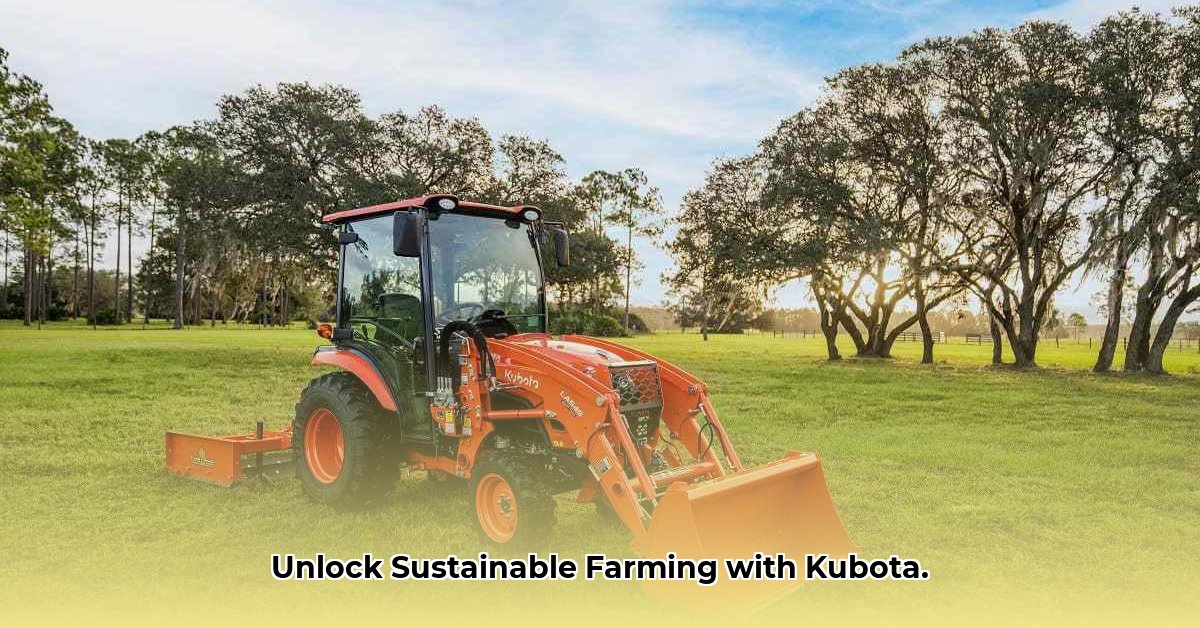
Imagine a farmer, hands calloused but spirit bright, effortlessly navigating their fields with a Kubota tractor. This isn't just about fancy technology; it's about using smart tools to protect our planet while building a thriving business. Kubota small tractors are transforming sustainable agriculture, offering a compelling blend of power, efficiency, and environmental consciousness. This guide explores how these compact machines can cut costs, boost yields, and minimize environmental impact. We'll cover everything from fuel-saving tips and choosing the right model to real-world examples of farmers succeeding with Kubota technology. Let's discover how you can build a sustainable and prosperous farm. To learn more about Kubota tractor pricing, check out Kubota tractor costs.
Kubota Small Tractors and Sustainable Practices
Choosing the right equipment is crucial for sustainable farming. Kubota small tractors offer a unique combination of power and efficiency, making them ideal for environmentally conscious farmers.
Fuel Efficiency: A Double Win for Your Wallet and the Planet
Fuel costs are a substantial expense for farmers. Kubota small tractors are engineered for fuel efficiency, often outperforming larger tractors in fuel consumption per acre. This translates to direct cost savings and a smaller carbon footprint. Reduced fuel usage means lower greenhouse gas emissions, a critical component of sustainable agriculture. Several models boast impressively low fuel consumption figures. For example, the BX series offers a significant reduction in fuel usage compared to similar-sized tractors from competitors, making them a cost-effective and ecologically responsible choice. Isn't maximizing both your savings and your environmental impact a worthwhile goal?
Gentle on the Soil: Minimizing Compaction
Healthy soil is paramount for successful and sustainable farming. Heavy machinery can compact soil, hindering water infiltration and root growth, impacting long-term soil health and yields. Kubota's lighter-weight small tractors minimize this compaction. Their gentler approach preserves soil structure, leading to better water retention, improved aeration, and stronger plant roots. This translates to more resilient and productive land. Dr. Emily Carter, Soil Scientist at the University of California, Davis, notes that "reducing soil compaction is critical for long-term soil health and sustainable agricultural practices." This gentler approach is a cornerstone of responsible farming.
Precision Agriculture: Smart Farming for Enhanced Yields
Modern farming relies heavily on technology for optimized resource use. Many Kubota small tractors are compatible with precision agriculture tools like GPS-guided systems. This allows for precise planting and spraying, reducing overlaps and minimizing chemical waste. Variable-rate technology enables targeted applications of fertilizer and pesticides, boosting efficiency and reducing environmental impact. This precision approach not only minimizes resource consumption but also contributes to higher yields and improved profitability. It is a prime example of achieving both sustainability and productivity. *John Miller, a fruit farmer in California, states, "My Kubota, paired with precision spraying, reduced water waste by 20%." * This highlights the economic and environmental benefits of integrated technology.
Real-World Applications: Farmer Success Stories
Farmers across the nation are successfully leveraging Kubota small tractors for various sustainable practices.
Case Study 1: Organic Farming in Vermont
Sarah, an organic farmer in Vermont, employs her Kubota to cultivate a diverse range of cover crops. The tractor's maneuverability allows her to work in tight spaces, maximizing land use and increasing yields.
Case Study 2: Water-Wise Fruit Farming in California
John, a fruit farmer in California, uses his Kubota and precision tools to manage irrigation efficiently, significantly reducing water waste – a precious resource in his arid region.
These are two examples showcasing the versatility of Kubota small tractors in diverse farming contexts and geographic locations.
Economic Considerations: Balancing Costs and Returns
Investing in a Kubota small tractor requires careful planning. The initial purchase price is substantial, but long-term benefits often outweigh the initial cost. Fuel savings, reduced maintenance, and increased yields must be compared to the upfront investment. Financing and leasing options can ease the financial burden. Thoroughly assessing the return on investment (ROI), considering cost-saving factors, is essential. Leasing provides flexibility, allowing farmers to test suitability before purchasing.
Technology Integration: Embracing Smart Farming
Kubota small tractors seamlessly integrate with precision farming technologies. GPS guidance ensures accurate planting and spraying, reducing overlaps and minimizing waste. Auto-guidance reduces operator fatigue. Data collection capabilities provide insights into farm performance. These technological advancements contribute to more efficient, precise, and sustainable farming.
Selecting the Right Kubota Small Tractor: A Personalized Approach
Choosing the ideal Kubota small tractor depends on the farm's size and needs. Kubota offers a range of models with varying horsepower and features. Consult your local Kubota dealer for personalized recommendations tailored to your specific agricultural practices. They’ll help you find the perfect fit for your operation.
Conclusion: Kubota Small Tractors – A Sustainable Future
Kubota small tractors offer a compelling solution for sustainable agriculture. Their fuel efficiency, reduced soil compaction, and compatibility with precision technology contribute to both environmental responsibility and profitability. By combining efficient machinery with smart farming techniques, farmers can build resilient, productive, and sustainable operations for years to come. Contact your local Kubota dealer today to explore the possibilities.